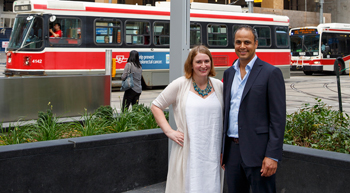New group provides resources and peer support for trauma survivors

By Kelly O’Brien

Margaret Harvey, with orthopedic trauma surgeon Dr. Aaron Nauth, stands in front of St. Michael’s, where she was treated after being hit by a garbage truck in 2012. (Photo courtesy of Bruce Zinger)
After she was hit by a garbage truck in 2012, doctors told Margaret Harvey’s husband she had only a 30 per cent chance of survival.
Harvey pulled through, but the road to a full recovery would prove long and difficult, both physically and emotionally.
After being treated for a few weeks at St. Michael’s Hospital, she was transferred to another hospital, and then a private retirement home to complete her rehabilitation. When she returned home, she realized how much her trauma had changed her life.
“I thought that when I went home, I would be better, but I wasn’t, and it took me a while to realize that things were just beginning,” she said.
| For more information about My BeST, including how to get involved, visit unityhealth.to/trauma-survivors-meetings |
She tried to go back to work, but she said even one day a week was too much for her, so she was forced to take medical leave. It was then that she discovered the Trauma Survivor Network.
“I felt so alone, and I thought, who has been through this? I need to talk to somebody so I can know how this is going to end for me,” she said. “I couldn’t sleep and I was up all night, so I went online and found it, and I thought, this is exactly what I need.”
However, there was no Trauma Survivor Network branch in Canada. She approached St. Michael’s Hospital with the idea of establishing a group to connect outpatient trauma survivors with support services.
The group, called My BeST (Beyond Surviving to Thriving), is being organized by Harvey and Amanda MacFarlan, a trauma registry manager and quality improvement specialist at St. Michael’s, along with a committee including social workers, trauma surgeons, psychiatrists, physiotherapists, patient experience advisers and spiritual care providers.
The group will help trauma survivors manage the psychological and social impact of their injuries.
“You can fix bones and you can fix muscles, but you also need to treat minds, and you need to respect that when someone goes through a physical trauma, their whole life could change on a dime,” said Harvey. “How are you going to deal with that?”
How people deal with trauma is determined by a number of different factors, Harvey said. She was lucky to have the resources necessary to seek out the treatment she needed. My BeST aims to help people who don’t have access to those resources on their own.
“I was so lucky that I had a home, money, kids, people around me, I had lots of support,” she said. “But a lot of people don’t have any of that, and trauma has very real impacts on peoples’ mental health, so it’s something that needs to be addressed.”
Harvey said she wants people to understand that post-traumatic growth is possible.
“People go through trauma every day, and they can move past it, but first they need to address it,” she said. “If we offer the help and people seek the help, they can improve, they’re not doomed to have post-traumatic stress disorder forever. You can move on from that.”
About St. Michael’s Hospital
St. Michael’s Hospital provides compassionate care to all who enter its doors. The hospital also provides outstanding medical education to future health care professionals in 27 academic disciplines. Critical care and trauma, heart disease, neurosurgery, diabetes, cancer care, care of the homeless and global health are among the hospital’s recognized areas of expertise. Through the Keenan Research Centre and the Li Ka Shing International Healthcare Education Centre, which make up the Li Ka Shing Knowledge Institute, research and education at St. Michael’s Hospital are recognized and make an impact around the world. Founded in 1892, the hospital is fully affiliated with the University of Toronto.
